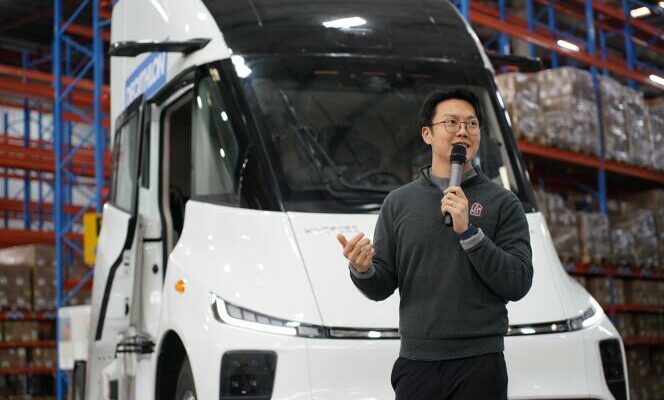While Tesla semi-trailers are trickling out of their Nevada factory, a new player wants to shake up the sector: the Chinese start-up Windrose, which already produces imposing trucks in China, is preparing to announce the construction of a factory in Antwerp, Belgium, for 300 million euros. “We have not yet signed, but discussions are at an advanced stage for the establishment of our European headquarters and an assembly plant”explains to World the founder of the start-up, Wen Han, who provides support with a photo of a handshake with the mayor of Antwerp.
With a range exceeding 600 kilometers at full charge, the machine of the ambitious Chinese boss, passed through an autonomous driving company in Silicon Valley, announces performances similar to the Tesla Semi, for a price which he promises lower than the 250,000 dollars (230,000 euros) from its American competitor, and significantly less than Daimler trucks in the same category, priced around 480,000 dollars. The recipe for these competitive prices? “The Chinese supply chain, and R&D [recherche et développement] Chinese »said the young 33-year-old boss, smiling, visiting Paris at the end of March.
Still little known, the start-up, founded in March 2022, has already convinced potential customers, such as Decathlon, which is counting on electricity to reduce its carbon footprint by 20% by 2026, or major transporters like Hong Kong’s Kerry and China’s Rokin, which are seeking to decarbonize their supply chain. A task that has so far been difficult: if electric cars have offered sufficient autonomy for several years, electrifying heavy goods vehicles requires gigantic batteries and charging capacities greater than the current offer to quickly replenish their electrons.
In 2022, only 1.2% of trucks sold worldwide were electric, including an even smaller share for long-distance semi-trailers, according to the International Energy Agency. Behind Tesla, the heavy goods giants, such as Ford, Volvo, Daimler or Renault, or the Chinese electric specialist BYD, have already launched electric models, but they are either smaller or reserved for regional services, because their autonomy is limited (300 kilometers for the latest Volvo and Renault models).
“Other sites, in Belgium or France”
Less than two years after its founding, the company, which has around a hundred engineers, obtained approval for its first semi-trailer in China, in December 2023. It is also developing a lighter vehicle, and a version with hydrogen of its heavy goods vehicle, while working on the autonomous driving of its vehicles. Co-founded by Wen Han and Haoli Chen, former technology director at Dayun, a Chinese truck manufacturer, the young start-up managed to convince major investors such as the banking group HSBC, a Chinese investment fund supported by the Singaporean Temasek, or the city of Hefei, capital of Anhui (in central China). It hopes to be able to deliver its first trucks at the end of 2024 and is targeting the Chinese, European and American markets.
You have 39.8% of this article left to read. The rest is reserved for subscribers.
